Part 3: Depression and Aftermath—Home Again
Read Part One Read Part Two Read Part Four Read Part Five
Those first few days back at home were some of the lowest times in my life. I know my parents were stunned and confused at my return, and I can vividly remember meeting with them in my dad’s office upstairs once my move-in had settled. They wanted to know why I got kicked out, which was understandable and foreseeable. On the long, lonely drive up to Illinois, I had nothing but time and my thoughts to figure out what exactly I would tell them. But even with all that time, I couldn’t find a creative way to tell the truth. I never regained the courage I once had when meeting with my sister a few days before. Given that they had already tried to send me a message of concern regarding gay websites back in January with their discreet intervention, I knew that telling my parents the truth now would only underscore and worsen their alarm at the trajectory of my life, which could consequently mean a stringent amount of imposed restrictions while living there. That was not what I was looking for, especially as beat up as I felt, so I lied to them. I told them that I had gotten caught watching The Sixth Sense in a theater.
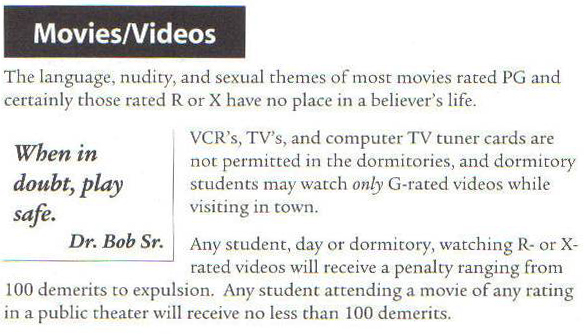
BJU Student Handbook 1997, Page 22
This was a feasible lie: I had recently heard of a graduate assistant who was expelled for watching The Jackal in theaters, so at least there was precedent for such a punishment. Growing up, our family wasn’t allowed to attend movies, but I knew various families in the churches we attended could, so I chose this lie because I knew it was reprehensible enough in the eyes of BJU, but not essentially immoral enough in the eyes of my friends and family to cast aspersions on my character. (Incidentally, I wanted to make sure I was not caught in this lie should anyone ask any plot-driven questions about The Sixth Sense, so in what could only be described as pathetically humorous, I actually went to see this movie by myself soon after getting home.) With that lie in place, my parents couldn’t have been more supportive in helping me get back on my feet. But I was having a much more difficult time accepting myself. I specifically remember calling myself a loser to them at this same meeting, and it was a feeling I had difficulty shaking even months after I started to find some sort of direction in my life again. Furthermore, I don’t think I ever truly understood what the phrase “adding insult to injury” meant until I received a letter from the BJU Alumni Association a week or two after getting home. Essentially, I was told that since I had been dishonorably dismissed from the university, I was suspended from the association until I had “restored” my “relationship to the University administration.” The cherry on top was not the “Yours truly” closing part of the letter, but the verse printed at the bottom: “that ye be likeminded, having the same love, being of one accord, of one mind.” I took this statement to be one more reminder that I had been banished from a community to which I so wanted to belong. I was not in “one accord” anymore, but I desperately wanted to get back into the fold.
In the meantime, my parents gave me a choice: I could attend church with them or find one on my own; I was grateful for that kind of freedom, but I chose to attend with them. It was a Hyles-Anderson feeder church, one that I was fine in attending because my parents were an integral part of the church leadership there and because I had been a member there since high school. But I cannot exaggerate the sense of dread I felt in returning to church for the first time. I knew I would be facing responses of shock from church members, and I did not have the energy to explain why I was home unannounced. Not only that, I had to meet with the preacher to “confess” why I was kicked out before I could participate in the church choir and be a Sunday school teacher. He didn’t appear too scandalized at my fake reason, which was nice, but still, the humiliation felt so real when I returned to church so unexpectedly.
To make matters even more depressing, there wasn’t much opportunity for many suitable careers for me in the area, so while I figured out what I could do, I worked several temp jobs. Though I had close interaction with my parents every day, there were lots of times during these first few months home that I found myself alone with ample time for introspection, so I decided that I would channel my depression into something I still find therapeutic: writing. I began to keep a regular routine for writing down my thoughts about who I was, what I was feeling, and what I wanted to be. These writings took various forms: from the extremely personal prose to the weekly updates I would email friends and family about my different experiences. Getting the words down on paper really helped in some weird way to collect my thoughts and document my feelings, even if they weren’t exactly publishable material. Often, I would write poorly constructed stream-of-conscious poetry—what might nowadays be called “rant poems”—such as this one that I wrote sometime in October 1999 while on a temp job. This is the first time I’ve ever shown these writings to anyone.
I’m a paradox
not an enigma
Paradoxes are much closer to hypocrites
and that is what I am
educated, loved by family, friends, and God
but yet obviously stupid
and hated by myselfi grope around sickeningly
for my glasses
to greet the harsh new day
i follow all the rules
well, most of the rules
present myself as a respected individual
but then i fall from grace
when no one sees
culminating in action after secret action
until light creeps in,
and soon Truth
spreads news of me
the real me
to my familyand what surprises me
is how loving each is
when i know there’s much
more to the Truth than
even they know.That’s why I’m a paradox
i seem to have it all together
when my insides gnaw
in a sick solitude of sorrow,
disgusted with the shadows
terrified of the light
stupefied by my slitheriness
Setting aside questions about literary quality, you can see that I was not only consumed by my contradictory nature, but I was also obsessed with running away from the Truth, or, perhaps, trying to live within the boundaries of my own honesty that I had constructed for myself since coming back home. But even then I knew that I hadn’t been completely honest with those who truly cared about me for fear that they would disown me. So, yes, there were periods of extreme self-hatred and guilt during this time, but at least I was able to tell someone about those thoughts: myself. In the midst of this whirlwind time when I was trying to find stability and direction, I continued to find time to write. Here is another example of how limited I felt in being open to anyone.
11-27-99
Again I pray before I sleep
as reality brutally reminds me
of just how low I am
It’s funny, somewhat euphoric actually,
maybe because I wake up each day
denying my mistake
disbelieving I messed up
I who always please my teachers
I who never openly rebel
I who always wear a smile
I who never hit and yellShamefully I shy from communicating
with friends
Hurt by my own actions
Self-inflicted bewilderment
Remorseful that I can’t share
my world
my whole world
with anyone
Getting “shipped” changed me. Something inside me died, leaving a part of me forever numb. As the “pseudo-poem” suggests, I struggled with “denying” and “disbelieving” that this was happening to me, and the theme of Truth and honesty really hit me around this time. Near the end of my time at BJU when I was meeting guys, I began to realize how caught up I was in my own lies by giving out a fake name and identity should they ask me personal questions. It became extremely difficult to balance two diametrically opposed kinds of queer lives. In some ways I was emotionally devastated and depressed in getting expelled, but in other ways, I thought at the time it could be a relief, too, because if God so clearly wanted to get a hold of me, then this was the sign that I needed to be at a point where I could be honest with myself about not acting on my gay-queer attraction. And that’s what I did.
For approximately the next two years at home with my parents, I became severely contrite and heavily involved with my parents’ church: singing in the choir, participating in special music numbers, playing the organ for congregational singing, teaching a Sunday School class. In all of this I tried very hard to quash my feelings for guys by keeping my mind and attention on God. Ultimately, I tried so hard to distract myself from being who I was, I thought the only way I could maintain my honesty about not being gay was if I didn’t physically meet any guys. And I did keep that bargain with myself the whole time I lived at home, but my physical self-restraint from interpersonal relations couldn’t keep me from my own inner mental, spiritual, and emotional turmoil. There were times I would write in my journal at how disappointed I would be in myself for having an erotic gay-queer dream the night before, a dream I had no control over. Additionally, my senses were heightened to notice anything on the radio or TV that was even remotely related to being gay-queer. It became more and more clear that I couldn’t get away from my gay-queer self even when I completely immersed myself into a strictly fundy-queer conservative church and home environment.
I also kept myself busy working full time as a substitute teacher and commuting to finish my master’s degree. Had it not been for the presence of my mother, who was very familiar with the educational system, I might have been doomed to temp-job purgatory for who knows how long. Thankfully, she advised me how to pursue jobs as a substitute teacher in the various school districts: by early November, I had my first teaching gig. But this kind of a job brought with it its own psychological baggage. Because of the nature of that field, I would be living in suspense from day to day, wondering if I would have a job tomorrow, my feeling of self-worth dependent upon whether I did. Also, thanks to the prompting of my mother, I continued my graduate studies at the University of Illinois-Springfield (UIS). I was well aware of the potential transfer-credit perils that came with attending an unaccredited university like BJU. Fortunately, we knew that since UIS had accepted my mother’s transcripts for her master’s degree there, there was precedent for them to accept mine. But even though I was beginning my academic journey away from BJU, I discovered that I had difficulty leaving the past behind.
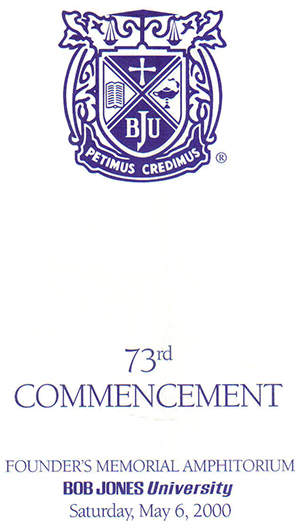
BJU 73rd Commencement program cover
As part of the BJU expulsion process, I knew I was not allowed to return to campus for at least a full year, and even then only with the express forgiveness and permission of the administration. My younger brother graduated from Tennessee Temple University (TTU) at the end of the Spring 2000 semester, so our family drove down there to attend his graduation. As it turns out, I was the only person who could pick up my sister in South Carolina and take her back to Tennessee and then home, but since May technically was not a full year since my expulsion, I grew worried of what might happen should I be found “illegally” on campus. We as BJU students were well aware that the Public Safety Department possessed a list of people, complete with photographs, who were not allowed on campus, and I knew this list was strictly enforced. In my fear, I began to imagine all kinds of scenarios of being escorted off campus while helping my sister pack. I couldn’t risk that, so I wrote for permission. In their response, I was told that I could pick up my sister on the Saturday morning of graduation, but that I could not be on campus any earlier than that. Obviously, the campus holds bittersweet memories for me, but I tried to keep a positive outlook for my sister while I was down there, and was grateful that none of the friends I saw that day brought up my expulsion.
I remember feeling so oddly removed from such a familiar situation. My sister and I watched the Commencement Exercises remotely from Rodeheaver Auditorium — which was fun because it was less stuffy — rather than watching it live. But inside, my heart was aching, not only from the reminder of what was, but also what could have been: I was back on the campus that expelled me on the morning I was supposed to have graduated with my master’s degree. Instead of being on stage, I was in the audience, watching the video screen, my pulse racing as I spotted my cohort of fellow Graduate Assistants receive their diplomas. As much as I wanted to look away during that moment of the ceremony, I felt compelled to watch them, as if in some small way I was celebrating with them.
May 5, 2000
I know what goes on in your heads
I see the look of spiritual condescension
Yes. I was the one who threw the wrench
into my own central mainframe,
And now I have the I Love You virus.
I wish I could self destruct.
I wish I could wake up.
I wish I could find a time machine.I’m burdened with an unhidable secret
that makes me flush when I tell,
but it’s not even the right secret.
I can’t even explain why I’m not
with all of you in black mortar boards
and suits and regalia.I am in the stands with my freshman
sister, ending my years here in
disgrace, such a dishonorable discharge
that’s singed on my heart—
PETIMUS CREDIMUSWhere can I run from thee?
Who shall save me from the perils
of my own mistakes?Tonight I felt as though October [1999]
never was, and May is.Tonight I’ve felt the disillusioned,
secure 2 hours of autopilot mindMy reasoning returned and I stoop
once again. My God! My God!
Why hast I forsaken thee?1
Was I ever in the fold at first
or have I suffered the worst
by being precluded, excluded by
my own lust. What is is.
October was. May is.
Lance was. Is he still?
Why am I here? Why am I still alive?So Saturday come quickly and
let me go again, back to TTU,
back to anonymity, away from
constant flashbacks of my embarrassment.
I actually wrote this entry in my journal the night before the graduation ceremony after I watched a movie with family and friends. The movie brought about a mental escapism, whereby I could forget the past for a brief time. Of course, being right down the road from BJU campus made it difficult to maintain that obliviousness for very long. Lest anyone reading the end of that “pseudo-poem” fear how suicidal I was, I should clarify that we as fundies have been trained to identify causes and consequences of sin. Specifically, we were told that there was a certain kind of sin that could cause God to “call us home.” Pastors especially seemed adept at providing sermon illustrations where a person’s death was undoubtedly attributed to some form of rebellion against God’s word. So while indeed I was depressed about the whole situation, knowing that I was not any nearer a resolution between my fundy-queer and gay-queer identities made me wonder how I could still be alive, especially if my life were emblematic of a rebellious Christian.
By December 2000, I had completed my master’s in English, and it seemed that my life was getting back on track. But the longer I stayed away from BJU, the more painful and awkward the memories of my past would resurge when triggered, which happened again in April 2001. As it turns out, my cousin was getting married in the War Memorial Chapel on campus in June, and I was to be in the wedding party. I wasn’t quite sure I had ever been properly “forgiven” by the administration, and I didn’t want to risk an embarrassing scene during the wedding, so I sent another letter near the end of April to the Dean of Men, this time cataloguing in-depth how I had sincerely been seeking solace from my identity crisis in God’s word and by being active in my church. In the letter, I was too ashamed to even mention what actually got me kicked out, so I vaguely referred to it as the “incident.” The following is what I wrote down in my journal about the response I got from him.
6/8/01 7:00pm
I went to get the mail this fine, sunny morning. [. . .] Then I saw the letter from Bob Jones, and I instantaneously began to tremble. I opened it right there, skimming the two paragraphs from Mr. Miller. I knew the first paragraph would be small praise talk. The meat of his letter would be in the second paragraph. Basically he wants me to call him or Mr. Daulton (like I’ll ever speak to him again) and “advise” them about my victory over the problem that lead me to have to leave Bob Jones because “I mentioned nothing of this in my letter.” Even if I had, I think they still want to talk with me.At first I felt fear, because I know I’m not rehabilitated yet. I want them to think I am. But I’m tired of lying. [. . .] How much would they want me to tell them? [. . .] And then I was worried because I’d have to tell them how I achieved victory over this, and as I said before, I’m tired of lying.
Driving to Wal-Mart, I thought how cynical Tony had sounded—“That’s nice you’re involved in the local church, but we think you’re still a reprobate.” And then I thought, why do I worry so much about what they think? It’s over. There’s no way they’d ever take me back anyway, and everyone knows about me already. At that point, I felt a little bit of release and relief. It was like I had nothing to lose. I didn’t want them to accept me; I just wanted to be allowed on campus.
At the checkout lane at Wal-Mart, I felt a little better about explaining my rehabilitation [over the phone to Mr. Miller]. I would include a [sample] usage of my Bible reading, a renewed interest in tithing, an interest in reading more religious works like A.W. Tozer’s The Knowledge of the Holy; Thomas A. Kempis’ Imitation of Christ; and Foxe’s Book of Martyrs; and an intense prayer program. I would hope by all these plus asking God to change my heart, Tony would be appeased. My only trouble is if he should ask if I’ve ever slipped up. He could also be suspicious if I’ve never told anyone. But, at this point in my life, I’m tired. I think the Lord didn’t give me [this girl from my past who is currently on my mind] because my heart’s not right and I’m not ready. Lord, when will I be ready?
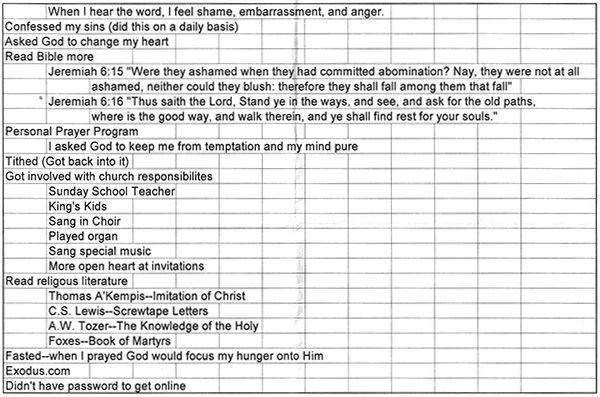
Lance’s “spreadsheet of contrition”
It’s funny looking back at my thought processes now. Obviously, I was not able to resolve such a huge, long-lasting mental conflict within one visit to Wal-mart. The fact of the matter is that I knew I was at the mercy of the administration because they had damning information about my being gay-queer that I had not yet revealed to my family. So even though I might have been able to mentally release some of the pressure of needing to be accepted by them, I still knew I needed to cooperate with the administration lest they somehow reveal the façade I had created for my family. Knowing how flustered I was going to be on the phone, I prepared this spreadsheet to help me keep track of all my thoughts and evidence for the conversation. I needed to be ready in case they scrutinized my story. You will notice I even mentioned “Exodus.com,” the infamous “ex-gay” program, on this sheet as a potentially viable option of recourse for “rehabilitation,” but I never wound up pursuing it. I just figured it could be something I would mention that might be convincing in a conversation with Mr. Miller.
My face was flush as I received the phone call while at my cousin’s house in South Carolina just days before the wedding. I got through the conversation as quickly as possible, but he specifically wanted to know if I had “achieved victory” over my “sin” of being gay. While I had not physically met with any guys at this time, I had had infrequent occasions to look at gay websites while at a library, so I knew my gay-queer desires had not vanished. So I lied, telling him what he wanted to hear, and by the end of the call, I seemed to satisfy his questions and was no longer restricted from campus, which was a great relief to hear: I wouldn’t have to keep asking permission through awkward letters. Incidentally, once my uncle got wind of my required phone call, he told me that if I had not been allowed back on campus, he would’ve raised a big stink. All I could think to myself was, “You don’t know the real reason. If you did, you wouldn’t respond this way. You would be mortified and probably not want me in the wedding at all.”
As I said before, I was so intent on being forgiven and placed back in the fold that I was happy I could reapply for admission into the Alumni Association. Surely, my life was finding direction again.
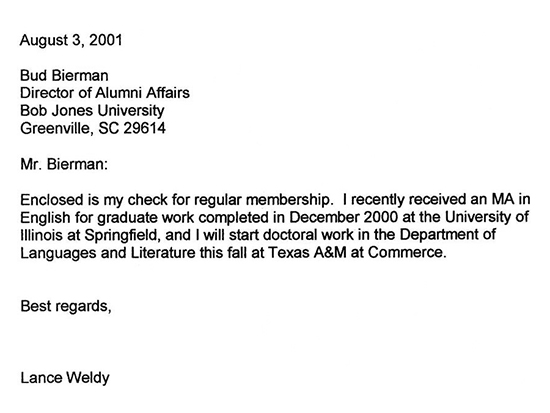
Lance’s letter requesting reinstatement in the BJU Alumni Assocatiation
By Spring 2001, I found myself at a major crossroads. I would need more education beyond the master’s to do anything in the field of English, and my GRE scores expired soon, so I either needed to find a Ph.D. program quickly or relegate myself to the workforce, which did not look promising in central Illinois. Fortunately, I was accepted into a program in Texas. But even there, I couldn’t get away from my past and my secrets. In an exceedingly awkward phone call before I actually moved to Texas, I was asked by the graduate studies director in my department for clarification about my transcripts, which blatantly read, “Withdrew at Request of Administration.”
Again, the shameful memories became fresh and raw anew, two years later, and I began to panic on the phone, wondering if this would be the deal breaker even after being formally accepted into the program.
Read Part One Read Part Two Read Part Four Read Part Five
1 I chose the informal second person “hast” instead of the grammatically correct first person “have” to invoke the language of scripture, but also to show the brokenness both in conjugation and feeling.
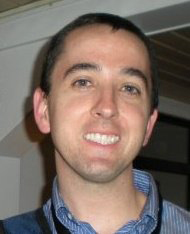

3 comments
Lance,
We were in those final three classes together, and I want you to know you were missed. I enjoyed your humor and your kindness and was so sad to see you go. And really; who on earth was crazy enough to be in two Dr. Silvester classes at once?! Along with two other classes and my wedding five days after finals (and four days before Christmas), I think a small part of me is still recovering.
“Midway in the journey of our life, I found myself astray in a dark wood, where the straight road had been lost.” We all travel a different path and seldom have the gift of seeing the steps ahead. Perhaps we’ll never see eye to eye on this subject, but count me among those who don’t judge and simply wish you God’s best.
Thank you, Lance, for the work you have put in here. As a former English professor myself (Westmont College, 1986-2004) who discovered her bisexual queerness late in life, I can appreciate the inner struggles you describe.
It’s like reading my own story… and my (sorry attempts at) poetry…
So proud of you, friend.